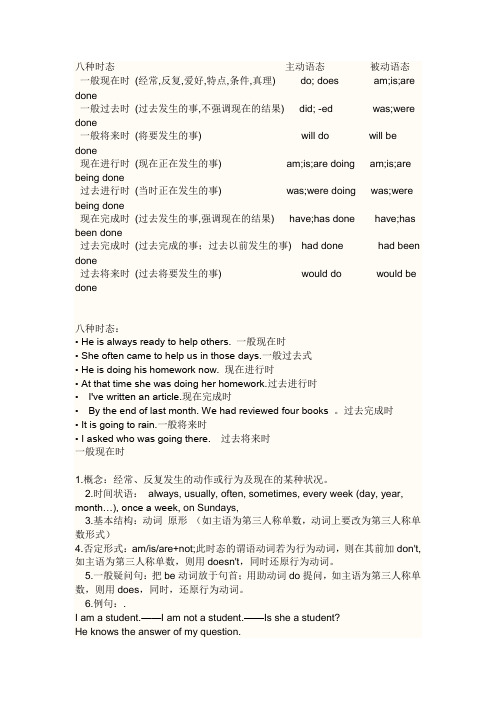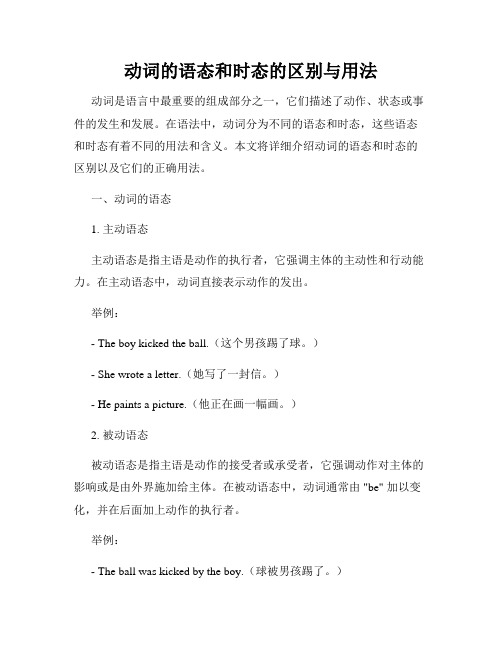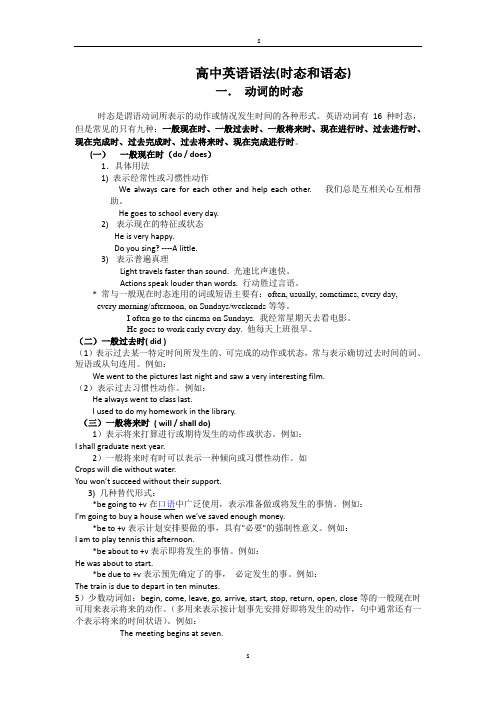动词时态与语态 doc
完整版高考英语动词时态和语态讲解

时态语态〔一〕一般在表示:1.在的常性、性作 eg:IreadEnglisheverymorning.2.客真理、普遍公立、科学事eg:Thesunrisesintheeast.3.有的趣、好或能力eg:Helikesplayingfootball.4.存的性、特征或状eg:Thesituationisencouraging.5.介故事情、新eg:Workersfacetoughtimesabroad.6.按刻表或按定划、安排将要放生的作〔常如:come,go,leave,arrive,begin,start,takeoff,return,stop,open,close等〕eg:Thetrainleavesat4:30p.m.注意:here,there,now,then等开的倒装句要用一般在代替在行。
如:Look!Herecomesthebus.一般去表示:1.去常性、性的作或状eg:Heoftencriedwhenhewasaboy.2.去某的状或作eg:Iwenttothebankjustnow.3.用于Ididn’tknow⋯或Iforgot⋯,表示不知道或不得,但在道或得的事情。
eg:Ididn’tknowyouwerehere.Sorry,Iforgottobringmybook.注意:表示去常生的作,也可以用“usedtodo⋯〞和“woulddo〞一般将来表示: 1.在看来以后要生的作或存在的状eg:Tomwillcomenextweek.2.事物的固有属性或必然eg:Oilwillfloatinwater. Fishwilldiewithoutwater.3.将来某个作的安排、划eg:HeisgoingtospeakonTVthisevening.注意:将来常表达形式:will/shalldo;begoingtodo;betodo;beabouttodo 〔此形式不能与状用〕在行表示: 1.此此刻正在生的作eg:I’mstudyingEnglishnow.2.段正在生的作eg:Wearebuildingoursocialism.3.情况的性eg:Idon’treallyworkhere.Iamjusthelpinguntilthesecretaryarrives.4.与always,forever,constantly,continually 用,表示参上或等感情色彩,但并非作正在行eg:Heisalwayshelpingothers. Sheisalwaysforgettingsomething.5.按划、安排近期生的作〔只限于come,go,leave,arrive,start,move,sail,fly,travel,stay等〕eg:Aforeigneriscomingtovisitourschool. I’mleavingforBeijingtomorrow.注意:不宜用行的作:感:look,smell,feel,sound,taste,see,hear情感:like,love,prefer,admire, hate,fear 心:wish,hope,expect,want,need,believe,thin,understand,agree,know,remember,forget 所有:have,contain,won,hold,belongto去行表示: 1.去某一刻或段生的作eg:HewaswatchingTVthistimeyesterday.2.与always,forever,constantly,continually 用,表示或无等感情色彩eg:ComradeLei Fengwasalwaysthinkingofothersneverthinkingofhimself.3.去划、安排好的将来作〔只限于come,go,leave,arrive,start,move,sail,fly,travel,stay等〕eg:Hesaidhewasleavingthenextday. Iwastoldthetrainwasstartingsoon.注意:去行可用来描故事生的背景,如:Thewindwasblowinganditwasraininghard.去将来表示: 1.去某一刻后将要生的去作或去的意、打算〔主要用于从句中〕eg:She wassureshewouldsucceed. Ithoughtyouwouldcome.注意:把一般将来中的助成去式,便成了去将来的表达形式在完成表示: 1.在已完成或完成且在有影响的作eg:Ihavefinishedmyhomework.2.表示始于去持至今的作或状eg:He’slivedher esince2005. I’vetaughtEnglishfor15years.3.到目前止的一段内,多少次或第几次做某事eg:He’sbeentoBeijing severaltimes.It’sthethirdtimethatI’veseenthefilm.4.将来某将要做完的作〔限于和条件状从句〕eg:Don’tgetoffthebusuntilithas stopped.5.生在去的,但已成在的或eg:We’veallplayedwithsnowandice.注意:没有包括“在〞在内或不是截止到“在〞止的状不能与在完成用。
(完整word版)八种时态主动语态被动语态

八种时态主动语态被动语态一般现在时(经常,反复,爱好,特点,条件,真理) do; does am;is;are done一般过去时(过去发生的事,不强调现在的结果) did; -ed was;were done一般将来时(将要发生的事) will do will be done现在进行时(现在正在发生的事) am;is;are doing am;is;are being done过去进行时(当时正在发生的事) was;were doing was;were being done现在完成时(过去发生的事,强调现在的结果) have;has done have;has been done过去完成时(过去完成的事;过去以前发生的事) had done had been done过去将来时(过去将要发生的事) would do would be done八种时态:• He is always ready to help others. 一般现在时• She often came to help us in those days.一般过去式• He is doing his homework now. 现在进行时• At that time she was doing her homework.过去进行时• I've written an article.现在完成时• By the end of last month. We had reviewed four books 。
过去完成时• It is going to rain.一般将来时• I asked who was going there. 过去将来时一般现在时1.概念:经常、反复发生的动作或行为及现在的某种状况。
2.时间状语:always, usually, often, sometimes, every week (day, year, month…), once a week, on Sundays,3.基本结构:动词原形(如主语为第三人称单数,动词上要改为第三人称单数形式)4.否定形式:am/is/are+not;此时态的谓语动词若为行为动词,则在其前加don't,如主语为第三人称单数,则用doesn't,同时还原行为动词。
动词时态和语态总结

四、现在进行时 1.表示说话时正在进行而尚未完成的动作或状态。
We are having an English lesson. 2.表示现阶段一直在进行的动作,但说话时不一定正在进行。
The workers are building a new factory.
3.有时可表示即将发生的动作〔只限于go, come, stay, leave, start, begin, arrive, return, fly, drive等动词〕这时常有一个
played table tennis almost everyday. 4〕在条件、时间状语从句中表示过去将来的动作。
They said they wo精u品lPdPTlet us know if they heard any news about him.
三. 一般将来时 一般将来时表示将来要发生的动作和存
精品PPT
二、一般过去时 1〕表达特定的过去时间内发生的动作或存在的状况,
常与last week/year/ month/ spring, a few days ago, in 1998等时间状语以及when等连词引
导的时间状语从句连用。
We had a good swim last Sunday.
3〕用在问句中,表示委婉礼貌; Will you be reading anything else? When shall we be meeting again?
When I was young, I took cold baths regularly. 2〕表达过去连续发生的一件件事。
He got up early in the morning, fetched water,
动词的语态和时态的区别与用法

动词的语态和时态的区别与用法动词是语言中最重要的组成部分之一,它们描述了动作、状态或事件的发生和发展。
在语法中,动词分为不同的语态和时态,这些语态和时态有着不同的用法和含义。
本文将详细介绍动词的语态和时态的区别以及它们的正确用法。
一、动词的语态1. 主动语态主动语态是指主语是动作的执行者,它强调主体的主动性和行动能力。
在主动语态中,动词直接表示动作的发出。
举例:- The boy kicked the ball.(这个男孩踢了球。
)- She wrote a letter.(她写了一封信。
)- He paints a picture.(他正在画一幅画。
)2. 被动语态被动语态是指主语是动作的接受者或承受者,它强调动作对主体的影响或是由外界施加给主体。
在被动语态中,动词通常由 "be" 加以变化,并在后面加上动作的执行者。
举例:- The ball was kicked by the boy.(球被男孩踢了。
)- A letter was written by her.(一封信被她写了。
)- The picture is being painted by him.(这幅画正在被他画。
)被动语态多用于强调动作的接受者或者主体的无法执行动作的情况。
二、动词的时态1. 现在时现在时态用于表示目前正在进行或经常发生的动作、状态或事件。
举例:- I go to school every day.(我每天去学校。
)- She is reading a book now.(她现在在读一本书。
)- They often play football on weekends.(他们经常在周末踢足球。
)2. 过去时过去时态用于表示已经发生或已经结束的动作、状态或事件。
举例:- I went to the park yesterday.(我昨天去了公园。
)- He studied in the library for three hours.(他在图书馆学习了三个小时。
动词的时态与语态变化

动词的时态与语态变化动词是语言中的重要组成部分,通过时态与语态的变化,我们可以清晰地表达出事件发生的时间和态度。
时态指的是动作或状态发生的时间,分为过去、现在和将来三个时态。
而语态则表示动作的主体与客体之间的关系,主要分为主动语态和被动语态。
在语言表达中,正确运用动词的时态和语态变化是非常重要的,下面将从几个方面详细介绍动词的时态与语态变化。
一、动词的时态变化1. 过去时态(Past Tense)过去时态用于表示已经发生或已经完成的动作或状态。
动词的过去时态一般由动词原形后加上-ed结尾来构成,例如:- I walked to school yesterday.(昨天我走路去学校。
)- She cooked dinner for her family last night.(她昨晚为家人做饭。
)2. 现在时态(Present Tense)现在时态用于表示正在发生或经常性发生的动作或状态。
动词的现在时态一般由动词原形来表示,例如:- They play tennis every Sunday.(他们每个星期天打网球。
)- The sun rises in the east.(太阳从东方升起。
)3. 将来时态(Future Tense)将来时态用于表示将要发生的动作或状态。
动词的将来时态一般由助动词will或shall加上动词原形构成,例如:- We will go on a trip next week.(下周我们将去旅行。
)- She shall study hard for the exam.(她将为考试努力学习。
)二、动词的语态变化1. 主动语态(Active Voice)主动语态表示主语是动作的执行者或实施者。
在主动语态中,主语在句子中承担着主要的语法成分,动词根据主语的人称和数的变化而变化。
例如:- They built a new house.(他们建了一座新房子。
)- She writes articles for a magazine.(她为一家杂志写文章。
动词的时态与语态

动词的时态与语态一:一般现在时。
1.表经常发生或反复发生的动作(常与often,usually,always,sometimes,every day 等连用)。
E.g. I also do some exercise every day.2.表现在的一般状况。
E.g. I love diving and I also enjoy swimming.3. 表永恒的真理。
E.g. The sun rises in the east and sets in the west.4. 一般现在时表将来。
①表按时间表拟定或安排好到时候就发生的事或动作。
E.g. The final exams take place next week.The flight to London takes off at 8am every day.②在状语从句中用一般现在时表将来。
(“主将从现”)E.g. We won't go to the park if it rains.二:一般过去时。
1.表过去某一具体时间发生的动作或存在的状态。
常与a moment ago,yesterday,last night, last week,last month,last year,an hour ago,just now, during the night, in 2008, in the Tang Dynasty等表过去的时间连用。
E.g. He bought a mountain bike last week.2. 情景对话中的一般过去时表“刚刚、刚才”。
E.g. ①I'm sorry,but I didn't mean to hurt you.②Oh,It's you! I never thought you were here,too.3.状语从句中表过去将来。
E.g. Anna said she would come if I promised to wait for her.三:一般将来时。
(完整)高中英语语法(时态和语态)

高中英语语法(时态和语态)一.动词的时态时态是谓语动词所表示的动作或情况发生时间的各种形式。
英语动词有16种时态,但是常见的只有九种:一般现在时、一般过去时、一般将来时、现在进行时、过去进行时、现在完成时、过去完成时、过去将来时、现在完成进行时。
(一)一般现在时(do / does)1.具体用法1) 表示经常性或习惯性动作We always care for each other and help each other. 我们总是互相关心互相帮助。
He goes to school every day.2)表示现在的特征或状态He is very happy.Do you sing? ----A little.3)表示普遍真理Light travels faster than sound. 光速比声速快。
Actions speak louder than words. 行动胜过言语。
* 常与一般现在时态连用的词或短语主要有:often, usually, sometimes, every day,every morning/afternoon, on Sundays/weekends等等。
I often go to the cinema on Sundays. 我经常星期天去看电影。
He goes to work early every day. 他每天上班很早。
(二)一般过去时( did )(1)表示过去某一特定时间所发生的、可完成的动作或状态,常与表示确切过去时间的词、短语或从句连用。
例如:We went to the pictures last night and saw a very interesting film.(2)表示过去习惯性动作。
例如:He always went to class last.I used to do my homework in the library.(三)一般将来时( will / shall do)1)表示将来打算进行或期待发生的动作或状态。
动词时态和语态

动词时态和语态一:时态1. 一般现在时 do/ does/ am/is/are 表示客观事实或普通真理或经常性的动作。
The teacher told us the earth moves around the sun.He often stays up till midnight to catch up with others.在时间、条件状语从句中常用一般现在时代替将来时(主将从现)。
但要注意由if 引导的条件状语从句中可以用shall(第一人称)或will表“意愿”,但不表示时态If it rains tomorrow, I won't go there.If you will accept my invitation and come to our party, my family will be pleased.2. 一般过去时did/ was/ were表示过去的事情、动作或状态常与表示过去具体的时间状语连用(just now, last year, in the past, last, after +一段时间,since 的从句中,the other day),或有上下文语境暗示------刚才”“在过去”,暗示“现在已不再这样”He lived in London for three years.(现在不在伦敦了)I thought he was an American.(我原以为他是美国人)注意:It's (high/about) time (that) +主语+一般过去时It is time that we got up.It's two years since he smoked.(他不抽烟已两年了)3. 现在完成时have/has done现在完成时则强调的是截止到现在为止所发生的事或者过去发生的事对现在的影响(标志词:since,in the past/last/recent +some time,just,recent(ly),lately,so far=up to now =up until now=by now,already,yet,several/many/...times)He has lived in London for three years.(现在还住在伦敦)注意:(1)在时间、条件状语从句中常用现在完成时代替将来完成时(主将从现) Don’t believe his words until you have looked into the case.(2)It/This is + 第几次/ 最高级+ 现在完成时This is the most instructive lecture I have attended.It is the third time that you have visited our school.4. 现在完成进行时:have/has been doing表动作从过去一直延续到现在说话时刚结束或该动作还将进行; 未完成性和暂时性They have been building a factory.现在完成时与现在完成进行时的区别:两者都可以表示“从过去开始一直持续到现在”,在含义上如着重表示动作的结果时,多用现在完成时,如着重表示动作一直在进行,即动作的延续性时,则多用现在完成进行时。
- 1、下载文档前请自行甄别文档内容的完整性,平台不提供额外的编辑、内容补充、找答案等附加服务。
- 2、"仅部分预览"的文档,不可在线预览部分如存在完整性等问题,可反馈申请退款(可完整预览的文档不适用该条件!)。
- 3、如文档侵犯您的权益,请联系客服反馈,我们会尽快为您处理(人工客服工作时间:9:00-18:30)。
动词时态与语态专练1. I learned that her father _____ in 1949.A. had diedB. diedC. was deadD. dead2. He hopes he can visit the United Nations while he ______ in New York next summer.A. has beenB. isC. will beD. shall be3. Perhaps the experiment ______ by this time tomorrow.A. have been doneB. will have been doneC. will doD. would have been done4. ---Come, Sam. I want to give you something.---Oh, how nice of you! I ______ you _____ to bring me a gift.A. didn’t thi nk, are goingB. never think, are goingC. never thought, were goingD. hadn’t thought, were going5. I received his letter today. I ______from him since he left.A. haven’t been hearingB. didn’t hearC. hadn’t heardD. haven’t heard6. Smith is to study physics as soon as he _____ military service.A. will finishB. has finishedC. can finishD. would finish7. We _____ to catch the 9:30 train, but ____ it was gone.A. had hoped, foundB. hope, had foundC. hope, have foundD. have hoped, found8. ---Who ____ my dictionary?---I don’t know. It _____ on your desk just now.A. took, had beenB. has taken, wasC. has taken, has beenD. took, is9. Would you give John this letter if you ____ to see him next week?A. happenB. are happeningC. will happenD. happened10. I _____ letters this morning and ____ six so far.A. am writing, wroteB. have been writing, have writtenC. wrote, writeD. wrote, have written11. When I was a little boy, my father told me the earth ____ round.A. wasB. had beenC. has beenD. is12. The police hurried to the sport only to find that the car _____ and a couple _____.A. stolen, killedB. had been stolen, was killedC. was stolen, was killedD. had been stolen, killed13. It ______ whether she will continue her work in the hospital.A. hasn’t been decidedB. isn’t decidingC. doesn’t decideD. hasn’t decided14. ---There is too much rain these days, isn’t there?---Yes, it _____ for a week.A. had been rainingB. has been rainingC. was rainingD. rained15. Tom ______himself while he _____ the machine.A. has hurt, was fixingB. hurts, is fixingC. hurt, fixedD. hurt, was fixing16. This railway is _____ in about two months.A. completeB. to have completedC. to be completedD. completing17. It is the first time ______such an exciting football match.A. I’ll watchB. I would watchC. I have watchedD. I watch18. Since when _____ you ____ so many young trees?A. have, plantedB. do, plantC. did, plantD. had planted19. When I got to his home, I _____ that he ______ to Beijing.A. told, had goneB. was told, had goneC. was heard, wentD. told, had been20. ---Why does Mary look so sorry?---Because she ______ by her classmates.A. has been laughedB. has laughed atC. was laughedD. has been laughed at21. Every morning they watch the nation flag _____ with the band playing the national anthem.A. raisingB. raiseC. being raisedD. risen22. Last week he promised that he _____ today but he ____ yet.A. came, didn’t arriveB. is going to come , hasn’t arrivedC. would come, didn’t arriveD. would come, hasn’t arrived23. Unless he _____ to help us, we shall lose the game.A. promisesB. will promiseC. would promiseD. had promised24. Don’t get that ink on your shirt, for it _____.A. won’t wash outB. won’t be washedC. isn’t washing outD. ca n’t wash out25. Tom _____ to work in the office though he didn’t like serving there.A. wantedB. was wantedC. was wantingD. had wanted26. My sister wants to work in the power plant which _____ still _____.A. is, buildingB. has, been builtC. is, being builtD. is, to be built27. Li He ____for a job, but he _____ any.A. looks, find outB. was looking, couldn’t findC. looks, couldn’t findD. is looking, can’t be found28. I ____ from her face that she ____ bad news.A. had seen, receivedB. would see, had receivedC. could see, receivedD. could see, had received29. Tom was said to _______ Mary for 40 years.A. have been married toB. have married withC. have got married toD. have married to30. In her room I saw that only a fire _____ there.A. being burntB. burningC. to be burningD. was burning31. ---______Mr Brown ______ this week?---No, he’s on holiday.A. Does, workB. has, workedC. Is , workingD. Did , work32. ---How is the injured driver?---Sorry. He _____ though the doctor did what he could _____ him.A. would die, savedB. was dying, to saveC. is dead , saveD. died, to save33. According to the timetable, the train for Beijing ______at six p.m.A. leavesB. has leftC. was leftD. will leave34. If you _____ it, I’ll lend the book to you.A. readB. have readC. will readD. want reading35. I didn’t know Charlie ______ in London. How long ______ here?A. was, has he beenB. was, has he comeC. has been, is heD. is, does he live36. ---Your telephone number again? I ______ quite catch it.----It’s 9768543.A. didn’tB. couldn’tC. don’tD. can’t37. The young man rushed out of the room, ______ into his car and started it hurriedly,_____ to get home as soon as possible.A. got, hopedB. got, hopingC. getting, and hopedD. getting , hoping38. ---I’m sorry I won’t be able to go with you.---But you _____ me you ______.A. told, were going toB. have told, would go toC. have told, were going toD. had told, were going to39. The students _____ busily when Miss Brown went to get a book she _____in the office.A. had written, leftB. were writing, has leftC. had written, had leftD. were writing, had left.40. ---Sorry. I’m late.---That’s OK. I _____ long.A. haven’t waitedB. don’t waitC. haven’t been waitingD. didn’t wait41. Please be sure to telephone me the next time you _____.A. will comeB. would comeC. shall comeD. come42. These kinds of shoes ______ well.A. were not soldB. won’t be soldC. are not soldD. don’t sell43. I arrived late ; I ___ the road to be so icy.A. wouldn’t expectB. haven’t expectedC. hadn’t expectedD. wasn’t expecting44. I ___ while reading the English textbook. Luckily, my roommate woke me up in time!A. had fallen asleepB. have fallen asleepC. fell asleepD. fall asleep45. My mind wasn’t on what he was saying so I’m afraid I ____ half of it.A. was missingB. had missedC. will missD. missed46. ----What’s that terrible noise?----The neighbors __ for a party.A. have preparedB. are preparingC. prepareD. will prepare47. Now that she is out of a job, Lucy ___ going back to school, but she hasn’t decided yet.A. had consideredB. has been consideringC. consideredD. is going to consider48. ----What were you doing when Tony phoned you?----I had just finished my work and ___ to take a shower.A. had startedB. startedC. have startedD. was starting49. The first use of atomic weapons was in 1945, and their power _____ increased enormously ever since.A. isB. wasC. has beenD. had been50. The crazy fans ___ patiently for two hours, and they would wait till the movie star arrived.A. were waitingB. had been waitingC. had waitedD. would wait51. She ___ her hairstyle in her hometown before she came to Chongqing for a better job.A. would changeB. has changedC. changedD. was changing52. ----You were out when I dropped in at your house.----Oh, I ____ for a friend from English at the airport.A. was waitingB. had waitedC. am waitingD. have waited53. The discussion _____ alive when an interesting topic was brought in.A. was comingB. had comeC. has comeD. came54. Because the shop ____, all the T-shirts are sold at half price.A. has closed downB. closed downC. is closing downD. had closed down55. Sales of CDs have greatly increased since the early 1990s, when people _____ to enjoy the advantages of this new technology.A. beginB. beganC. have begunD. had begun56. Turn on the television or open a magazine and you ____ advertisements showing happy families.A. will often seeB. often seeC. are often seeingD. have often seen57. He kept looking at her, wondering whether he ___ her somewhere.A saw B. has seen C. sees D. had seen58. ---The window is dirty. ---I know. It____ for weeks.A. hasn’t cleanedB. didn’t cleanC. wasn’t cleanedD. hasn’t been cleaned59. I____ you not to move my dictionary—now I can’t find it.A. askedB. askC. was askingD. had asked60. According to the art dealer, the painting ___to go for at least a million dollars.A. is expectedB. expectsC. expectedD. is expecting61. Telephone messages for the manager _____on her desk but she didn’t notice them.A. were leftB. was leftC. was leavingD. were leaving62. When Mark opened the door, he saw a woman standing there. He_____ her before.A. never sawB. had never seenC. never seesD. has never seen63. I can’t see any coffee in this cupboard._____?A. Has it all been finishedB. Was it all finishedC. Has it all finishedD. Did it all finish64._____my sister three times today but her line was always busy.A. I’d phonedB. I’ve been phoningC. I’ve phonedD.I was phoning65.---Have you heard from Janet recently?--- No, but I __ her over Christmas.A. studyB. will be seeingC. have seenD. have been seeing66. He ____ a model plane the whole morning. I supposed he would also do some washing.A. madeB. has madeC. was makingD. has made67. In 1960, this was the longest bridge that ___.A. was ever builtB. had ever builtC. has ever been builtD. had ever been built68. ----I thought you were proud of the work I _____.----I’m afraid not . You’d better change it for another.A. doB. had doneC. did D .would do69. --- How does your second-hand car run?--- It ___ run all right, but it is being repaired.A. hasB. hadC. doesn’tD. used to70. John caught a cold on Saturday and ______ in bed ever since.A. wasB. has beenC. isD. have been时态和语态专练答案1-5 BBBCC 6-10 BABAB 11-15 DDABD 16-20 CCABD 21-25 CDAAB 26-30 CBDAD 31-35 CDACA 36-40ABADC 41-45 DDCCD 46-50 BBDCB 51-55 CADCB 56-60 ADDAA 61-65 ABACB 66-69 CDADB。
